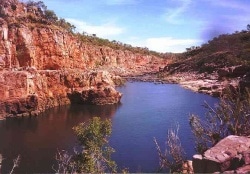“Jedda” is the story of an Aboriginal girl caught between two cultures, and the tragic consequences. She has been raised on a remote buffalo station in the Northern Territory by a white woman mourning the death of her own baby. It is understood that she will eventually marry Joe, the part-Aboriginal head stockman, but when a wild Aboriginal man arrives at the station looking for work and tries to attract her attention, she is mesmerised by his bearing and strange tribal customs. He abducts her and takes her on a long journey to reach his own tribe, at the same time pursued by Joe and the police, who want him on a charge of murder.
The chase sequence reveals stunningly beautiful landscapes from Central Australia to Kakadu, and the waters of Katherine Gorge. The film was shot in Gevacolour, under gruelling conditions in the outback, and achieved three firsts in Australian filmmaking – the first all-Australian feature film in colour, the first to cast two indigenous people in the starring roles and the first Australian feature accepted at the Cannes Film Festival. The script was loosely based on three true-life stories, the character of Marbuk inspired by Nemarluk, the Aboriginal fugitive and resistance fighter of the thirties. Processing and final post-production work was achieved at the Denham Laboratories, in the U.K.
Excerpt from biography:
“What a challenge my father had confronted! He was accustomed to challenges, but this one was monumental – experimenting with colour, when there were no film laboratories in Australia able to process it, and planning to star two untrained Aboriginal people in a script that at the time would prove controversial. Film Industry colleagues shook their heads and told him it would be “death at the box office.” When production plans were underway and Charles seeking extra funding, he secured an interview with the Prime Minister, Sir Robert Menzies. He always believed in going to the top first. Menzies was scathing in his criticism of the idea. Later, though, the Federal Government granted a petrol allowance for the location unit, through Northern Territory Administration. Perhaps they didn’t want them to do a ‘Burke and Wills’.”

4 comments
Susanne Carlsson
Susanne Carlsson @ Tue, 20 Nov 12 03:56:30 +0000:
Dear Peter, In reply to your comment/query re. Chauvel films on DVD: So far, “Jedda” is the only one of Dad’s films to be digitised. Currently a firm is proposing to restore, digitise and eventually market all my father’s major films – the project under discussion between us. I will be in Sydney on 27th this month, to accept an NFSA award for “Film Preservation”, and they will be screening “Forty Thousand Horsemen” on the same night. All being well, you should before too long be able to obtain a DVD of ‘Horsemen’. Thank you for your interest. Best wishes, Susanne
Peter Kealey
Peter Kealey @ Thu, 15 Nov 12 04:53:24 +0000:
Since I made my previous comment about being unable to find ‘Jedda’ or ‘Forty Thousand Horsemen’ on DVD, I have discovered (and purchased) a copy of ‘Jedda’ from The National Film & Sound Archive. Still unable to find ‘Forty Thousand Horsemen’ on DVD though.
Peter Kealey
Peter Kealey @ Sun, 11 Nov 12 01:37:34 +0000:
I have been trying to locate ‘Jedda’ and ‘Forty Thousand Horsemen’ on DVD for some time, without success. It would appear nobody has converted them for DVD. If this is indeed the case I believe it is shameful that such pivotal films have not been made available to the wider public.